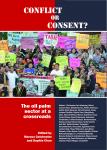
High Carbon Stock Approach finalises its Social Requirements
04 Aug 2020
The HCSA recently finalised a set of 14 Social Requirements that must be followed when applying the High Carbon Stock Approach. An Implementation Guide for the Social Requirements has also been developed and provides guidance for those applying the HCSA and its Social Requirements.










